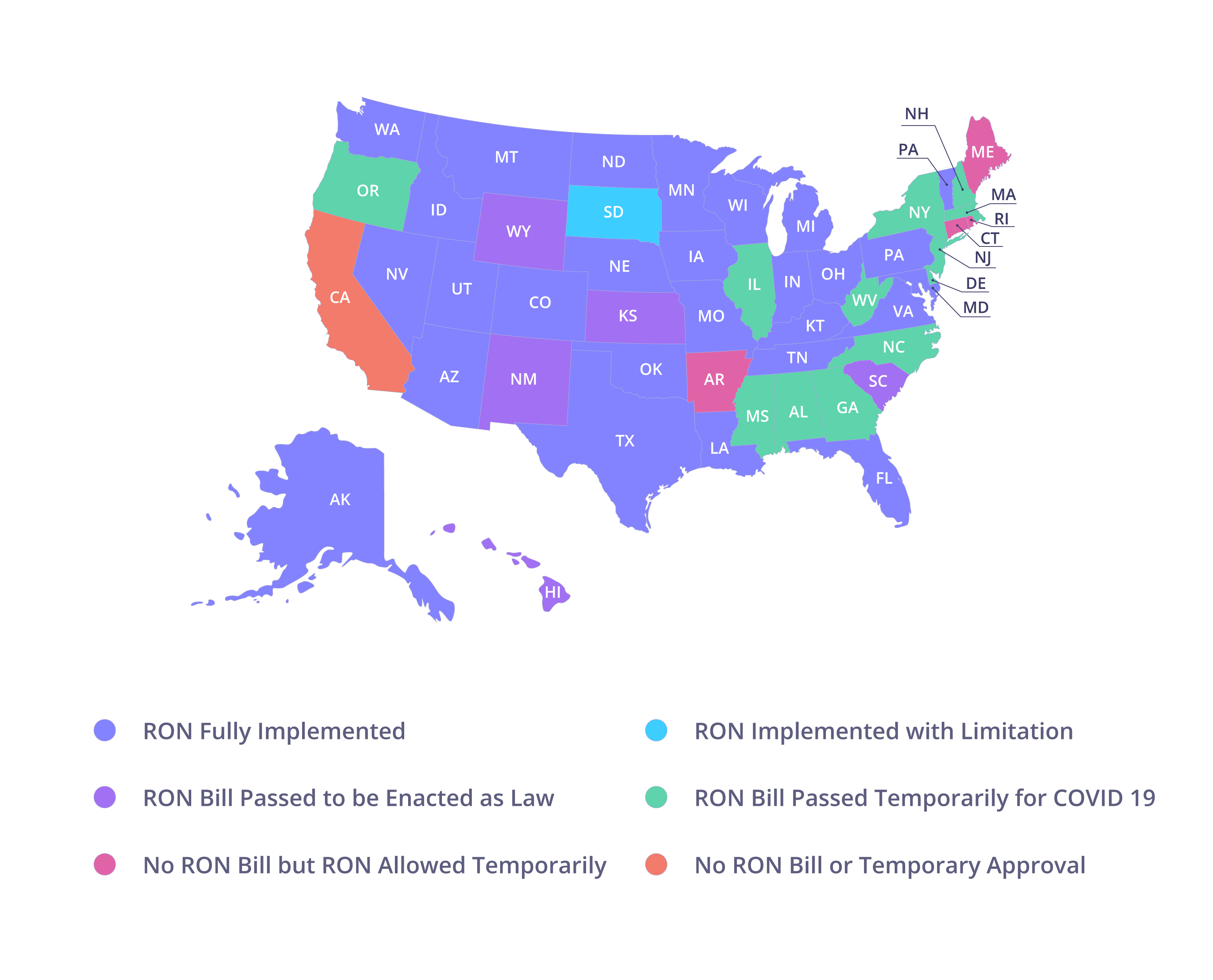All parties involved in a conventional home closing process must cut through a heap of paperwork, double check information in the documents, and mail them within a restricted period of time. Additionally, they must also commute to the title office themselves to complete the process.
This is the reason home closing is an anxious experience and the COVID 19 pandemic has only made it worse.
The demand for something that could transform notarization and make it simpler suddenly grew manifolds which set the stage for Remote Online Notarization or RON to take over.
Right now 27 out of 50 states have legally implemented RON and many are likely to follow the lead.
What is Remote Online Notarization or RON?
Remote online notarization is the process of virtually notarizing closing documents using online technology tools without the participants having to meet in person and use wet ink signatures.
The remote notary authorized by the state provides audiovisual software, apps for E signatures, and other software tools to run the process.
More and more states have adopted remote online notarization in the last year to provide a safe and hassle free closing experience for buyers and other parties involved in the transaction.
In this post, we will look into how remote online notarization is carried out and why it is better than traditional, in person notarization, where documents are signed using wet ink signatures.
Additionally, we will look into the legality of remote online notarization across the US and learn about the bills and statutes applicable currently across the 50 states. We will also discuss the requirements for notaries to go online and boost their business in this tough time. So without further ado, let’s begin.
History and Types of Notarization
Notaries are considered to have originated in the Roman Empire around 535 AD. Romans used notaries to prepare contracts, wills, and other contract documents and charged a fee for that.
As the Roman empire expanded and its literacy rate increased, it saw a vast demand for notaries in the following time. From there on, notaries became mainstream as the entire world slowly embraced it as the gold standard to certify deeds, contracts, and other legal formalities.
In person notaries have been operational in the United States since the 15th century that technically remained unchanged until the recent digital and internet advancement that provided a safer and cost effective medium to carry out the process and making it overall remote/virtual in nature.
However, this progression was not immediate. The first disruption came in the form of audio visual technology that allowed virtual meetings but signatures were still signed using wet ink. This was followed by the widespread use of electronic signatures that allowed signers to sign documents virtually but still needing to meet in person to close.
It took a while to make the process entirely virtual however both scenarios are still seen in many states. This brings us to the 4 types of notarizations.
In person Notarization. The conventional notarization process where all parties meet in person at the notary office to sing the documents with wet ink signatures. Many title companies still use this method that is attributed to a multitude of factors.
Remote Ink signed Notarization. The next is remote ink signed notarization. Parties sign the documents using wet ink signatures but express mutual consent using video conferencing or audio visual technology.
In Person eNotarization. Here, parties meet physically to verify identity and express consent while the documents are signed electronically.
Remote Online Notarization. Enables 100% virtual notarization for all parties involved in the transaction. Remote online notarization brings together a host of integrated technology tools that helps participants electronically sign documents, conduct online meetings for identity verification of the signer, and express consent of the parties to carry out the transaction.
You might wonder what really happens during the RON process is carried out. Well, the procedures may differ from one state to another but the underlying principles remain the same. We have summarized the process of RON in 6 steps, listed below.
A RON process is completed in 6 steps:
Notarization Request. The signer sends a request to the notary for conducting a remote online notarization.
Document Upload. The signer then uploads their document on the online platform approved by the state and used by the notary.
Identity Screening and Verification. This is the most important step of the process where the notary remotely verifies the identity of the signer according to the law of the state the transaction is happening.
There are multiple ways the notary can do that. It may question the singer’s personal history. Many times, the notary may also inquire about the credit history of the signer.
Alternatively, the notary may also go for credential analysis or ask the signer to show their ID on the webcam remotely.
Signature and Notary Seal. After the identity verification is completed, the notary and the signer sign the document virtually. This is done using an electronic signature application that can be independent or integrated into one platform that helps the notary do everything. This is followed by the application of the eNotary seal on the documents.
Record Keeping. The notary records other useful information from the signers. At the same time, the notary keeps the audio and video recording of the notary session for future reference.
Signed copies are shared with signers. In compliance with the state laws, the notarized document must be shared with the signer. This is why the signers are sent the notarized documents.
Overall, a remote online notarization closing may take 5- 20 minutes in total to execute from the start to the end.
Now that we know about how RON works, and how it is different from conventional notarization, the next step is to find out RON is legal in the state you are operating from? If yes, what are the requirements to become a remote notary? Let’s examine.
Legal status of RON across the United States:
Right now, remote online notarization is fully implemented in 27 states. Here is the list of states and the respective laws that make RON legal in respective states.
RON Fully Implemented
- Alaska. Two laws govern RON in Alaska. SB241 enacted on April 10th, 2020, and HB124 enacted on April 30th, 2020.
- Arizona. Senate Bill 1030 went into effect on April 20th, 2020.
- Colorado. SB 20-096 went into effect on Dec. 31, 2020.
- Florida. Bill tabled in 2019. Voted as a law under Chapter 117, Part 2. Went into effect on January 1st, 2020.
- Iowa. Bill 5041C went into effect on July 1st, 2020.
- Idaho. Senate Bill 1111. Went into effect on January 1st, 2020.
- Indiana. Code 33-42-17-3 went into effect on March 01, 2020.
- Kentucky. Senate Bill 114 went into effect on January 1st, 2020.
- Louisiana. HB122 became effective on June 9, 2020.
- Maryland. Senate Bill 678 became effective on October 1st, 2020.
- Michigan. 2020 PA 249 became effective on November 5, 2020.
- Minnesota. Section 648.348 became effective on January 1, 2019.
- Missouri. HB 1655 became effective on August 28, 2020.
- Montana. HB 370 became effective in April 2019.
- Nebraska. LB 186 became effective on July 1, 2010.
- Nevada. Chapter 240 has been made permanent.
- North Dakota. HB 1110 became effective on August 1, 2019.
- Ohio. Section 147.64 became effective on September 20, 2019
- Oklahoma. SB 915 became effective on January 1, 2020.
- Pennsylvania. SB 841 became effective on October 29, 2020.
- Tennessee. HB 1794/SB 1758 became effective on July 19, 2020.
- Texas. HB 1217 came into effect on July 1, 2018. Texas made amendments to the bill and published guidelines on the power of attorney and Guidance on RON in March 2020. While the state has fully implemented RON, a lot of lenders still want wet ink signatures.
- Utah. HB 52 became effective on November 1, 2019.
- Virginia. SB 827 and H2318 became effective in July 2011. Virginia was the first state to implement RON in the country.
- Vermont. 26 V.S.A. Sec. 5323 became effective on March 26, 2020.
- Washington. Chapter 42.45 RCW, Chapter 18.35 RCW, Chapter 308-08 WAC, and Chapter 308-30 give all the required directives for conducting RON. RON bill SB-5641 became effective on October 1, 2020.
- Wisconsin. AB 293 became effective on May 1, 2020.
RON Implemented with Limitation
- South Dakota. HB 1272 allows remote application of the signature when the remote signer knows the notary personally. Otherwise, it mostly becomes a RIN scenario.
RON Bill Passed to be Enacted as Law
- Hawaii. HB 2275 was introduced in July 2020. The state however is allowing remote closings temporarily using RON.
- Kansas. SB 106 enacted on April 21, to become effective on January 1, 2022.
- New Mexico. SB 12 enacted on March 21, to become effective on January 1, 2022.
- South Carolina. SB 486 was introduced on February 6, 2019. However, please note there is no executive order passed to temporarily legalize RON in South Carolina.
- Wyoming. SF0029 has been passed that allows remote notarial acts. It will be enacted on July 1, 2021.
RON Bill Passed Temporarily for COVID 19
- Alabama. SB 275 was sent to the governor in April 2021 to put into effect from July 1, 2021.
- Delaware. SB 247 passed in June 2020 with a sunset date of June 30th, 2021 to decide to continue it or not.
- Georgia. HB 334 introduced in Feb 2021 while a couple of executive orders were issued to urgently implement RON.
- Illinois. SB 2135 was introduced in June 2020.
- Massachusetts. S 2645 introduced to temporarily allow RON.
- Mississippi. Passed an executive order to allow RON temporarily.
- Oregon. HB 4212 was enacted to temporarily allow RON during COVID 19
- New Hampshire. HB 1249 allows RON temporarily. Became effective on July 17, 2020.
- New Jersey. Executive Order 103 of 2020 and Bill A3903 allow for the emergency use of RON during the COVID-19 pandemic.
- New York. SB 2508 has been signed by the governor but currently being opposed by the New York Bar Association. However, RON is temporarily allowed in NY following a string of executive orders.
- North Carolina. SB 704 introduced to temporarily allow RON.
- West Virginia. SB 469 has been passed and will come into effect from June 17, 2021.
No RON Bill but RON Allowed Temporarily
- Arkansas. A series of executive orders suspend the provision of requiring in-person witnessing and notarization of legal documents to allow RON temporarily.
- Connecticut. Has temporarily allowed RON with the help of an executive order. But no bills are in place.
- Maine. No bills passed but an executive order passed in April allows RON temporarily.
- Rhode Island. No bills passed, but RON is temporarily allowed.
No RON Bill or Temporary Approval
- California. California residents employ mobile notaries who make in person visits to notarize documents. In fact, RON is prohibited in the sunny state.
Now that we know the status of RON across all states, let’s see what it takes to become a remote notary. But before that, it is important to understand the rules laid by the ALTA MBA legislation which dictates the guidelines for notaries to go online.
The ALTA MBA Legislation
The MBA ALTA legislation, which is joint legislation between the Mortgage Bankers Association and the American Land and Title Association, has been working with officials and member networks to create a refined model for enabling remote online notarization that can be adopted by all the states without any hassles.
There are a total of 13 sections in the act that defines the terminologies associated with the act and also lays the standards of conducting the process, qualification, and much more.
Overall, the Legislation highlights the following:
- The first point in the ALTA MBA legislation is the necessity to verify the identity of the signer. This can be done using a photo ID, credential analysis, and identity proofing.
- The remote notary should also keep an electronic journal for all the notarizations done for future retrieval.
- A clear choice is given to the remote signer to choose between in person and remote online notarization.
- Ability to differentiate between notarizations performed online and in person.
- Practices compliant to Uniform real property electronic (RULONA) act and Uniform Electronic Transactions Act (UETA).
- Adherence to the rules laid by the National Association of the Secretaries of the State (NASS) and Mortgage Industry Standards and Maintenance Organization (MISMO). while setting standards for RON.
- There should not be any advantages given to one RON and eClosing vendor over others.
- A vision for technological improvement must be upheld that does not restrict the parties to one set of features or vendor.
All of the rules are reflected if a notary wants to provide online notarization in their respective state.
How to become an online notary?
While all of the rules above apply in some form or other, each state has a bit of variation to the rules. However, they are thematically identical.
Eligibility
In order to become an online notary in any of the states, the notary must meet the eligibility criteria first. These are:
- The applicant should be 18 years or older
- Should be a resident of the United States
- Should be a legal resident of the particular state
- Should not be charged with felony convictions
- Should be able to read and write English
These are some general eligibility requirements that are common across the states. Depending on the state you are applying to, additional criteria may be applicable.
How to Apply
Like the eligibility criteria, the application process across the state remains similar with small differences from one state to the next. Overall, the application process looks like this:
Surety Bond and E & O Insurance. You must get a surety bond before applying. It varies from one state to another and in many states, the condition for surety bond does not exist.
For example, Ohio does not have any surety bond while Texas requires online notaries to get a surety bond of $10,000. At the same time, Florida requires a surety bond of $25,000 with an E & O insurance of $25,000 to go with it.
Compliance with the State Laws. Check if you match all the criteria listed by the respective state. While they are more or less similar, there could be a few things that might be unique.
Fill the Application Form. The application form comes cheap and necessary to become an online notary. Carefully fill in the details and acknowledgment. Pay the application fee.
Training and Exam. Many states want you to have the necessary training in remote notarization. You may want to sign up for a course like this that allows you to prepare before you appear for the mandatory exam.
The Toolset and Vendor. Every state has its own list of approved technology vendors that help remote notaries to conduct the RON process. Title companies and notaries should also select a series of tools along with the electronic seal and digital certificate.
Other Mandatory Documents. Some states may require additional documents like identity proof or proof or permanent resident of the state to go forward and give the license.
If you are a traditional notary, it does not take more than 4-5 days to become an online notary. However, if you are not a notary yet, it may take 40-45 days in total.
You should also note that there is price capping when it comes to notarization charges. You cannot charge anything more than $25 for each remote online notarization performed.
Advantages and Risks of Remote Online Notarization (RON)
RON comes with numerous advantages which include benefits for the title company as well as home buyers and sellers. These include:
Cost Effectiveness. RON cuts down on costs otherwise incurred in conventional closing such as searching through a heap of records to determine property ownership, redoing documents in the event of an error, and recording the deed in the paper.
Security. One cannot simply change an electronic deed or the signatures within those digital documents after the digital notary seal is applied, making foul play difficult.
Transparency. According to the law, signed copies of the documents must be sent to all the parties involved in the transaction which makes RON transactions transparent and trustworthy.
Better Customer Experience. RON elevates the overall customer experience during the home closing process. Documents do not take multiple days to reach the buyer and signing documents do not need appointments. The final step of the transaction to transfer the deed is also online by the attorney, making RON a hassle free process.
While there are risks that pop up with online notarization concerning data breach and theft, a streamlined process that is filtered after a lot of iterations is reliable. If anything, RON is considered much safer than traditional notarization.
Remote Online Notarization is going to stay and likely to become mainstream in the coming times, attributed to its fast adoption and availability of RON vendors in the market. If you are a notary yourself and thinking to go online, there cannot be a time more appropriate than now.









